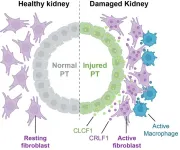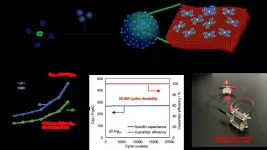(Press-News.org) Research Highlights:
In an analysis of 18 randomized clinical trials, people with obesity and high blood pressure who underwent bariatric (weight-loss) surgery were almost three times more likely to achieve blood pressure remission, defined as reducing to less than 140/90 mm Hg and no longer taking antihypertensive medication, and keep it under control in comparison to peers treated with medication and healthy lifestyle adjustments.
Over a 1-to-5-year follow-up period, people with obesity who had weight-loss surgery were seven times more likely to reduce the number of medications required to manage their blood pressure.
The researchers state that their new analysis confirms results of smaller individual studies indicating that weight-loss surgery is an effective treatment strategy for obesity-related high blood pressure.
Note: The studies featured in this news release are research abstracts. Abstracts presented at the American Heart Association’s scientific meetings are not peer-reviewed, and the findings are considered preliminary until published as a full manuscript in a peer-reviewed scientific journal.
Embargoed until 8 a.m. CT/9 a.m. ET, Thursday, Sept. 5, 2024
CHICAGO, Sept. 5, 2024 — People with obesity who underwent weight-loss surgery were more likely to control their high blood pressure over a 1-to-5 year follow-period compared to those who managed their high blood pressure with medications and lifestyle management, according to preliminary research to be presented at the American Heart Association’s Hypertension Scientific Sessions 2024. The meeting, in Chicago on September 5-8, 2024, is the premier scientific exchange focused on recent advances in basic and clinical research on high blood pressure and its relationship to cardiac and kidney disease, stroke, obesity and genetics.
Based on a combined analysis of data from 18 randomized controlled trials involving more than 1,300 participants, these findings confirm the positive results from previous research, the authors noted.
“Our findings indicate bariatric surgery is a durable solution for obesity-related hypertension since it results in high blood pressure remission, or long-term control, while reducing the dependence on blood pressure medications. Additionally, by improving blood pressure control, bariatric surgery also lowers the risk of cardiovascular disease and enhances overall heart health,” said study lead author Sneha Annie Sebastian, M.D., a researcher, graduate of Azeezia Medical College in Kerala, India and residency candidate from Alberta, Canada.
Bariatric surgery helps people lose weight by reducing the size of the stomach so people feel full when eating less and may also include procedures that change the structure of the digestive system so fewer nutrients and calories are absorbed. According to the 2022 guidelines from the American Society for Metabolic and Bariatric Surgery and the International Federation for the Surgery of Obesity and Metabolic Disorders, bariatric surgery is recommended for people with a body mass index of 35 kg/m2 or higher, regardless of presence, absence or severity of co-morbidities.
The current analysis, combining data from 18 randomized controlled trials in several countries, compared more than 1,300 people with obesity and high blood pressure who were randomly selected to receive either bariatric surgery or a non-surgical, medication or lifestyle intervention. After an average follow-up period of 1 to 5 years, the researchers found that compared to the control group, participants who had weight-loss surgery:
were 2.77 times more likely to lower their blood pressure to less than 140/90 mm Hg, defined as blood pressure remission, without the need for blood pressure-lowering medication;
were 7.1 times more likely to lower their blood pressure to less than 130/80 mm Hg, defined as blood pressure control, while substantially reducing their use of blood pressure-lowering medications;
lowered their systolic (top number) blood pressure by, on average, 3.67 mm Hg, compared to those in the medication and lifestyle management control group.
“Bariatric surgery is an effective solution for managing obesity-related hypertension. Future research should focus on conducting randomized controlled trials with long-term follow-up and large sample sizes, with a specific emphasis on hypertension outcomes, as many currently focus on diabetes outcomes. Furthermore, it is essential to evaluate the efficacy and cost-effectiveness of different bariatric procedures for various patient profiles and to identify optimal candidates for each type of surgery,” Sebastian said.
Study details, background or design:
The final analysis included 18 studies with 1,386 participants older than age 18 with obesity (average body mass index of 38 kg/m²), with primary or secondary outcomes reporting the effects of weight-loss surgery on blood pressure. 62.7% of participants identified as women, and 37.3% identified as men.
The studies were conducted between December 2002 and May 2024.
People in the bariatric surgery group had any of several procedures that make changes in the digestive system to facilitate weight loss. People in the control group were similar in obesity and high blood pressure but randomly selected for treatment with medication and lifestyle management rather than surgery.
The authors included multiple types of weight-loss surgeries, however, most of the studies focused on Roux-en-Y gastric bypass and sleeve gastrectomy.
Data from a subgroup of five studies were analyzed for hypertension remission and the use of medications; four of the five studies had hypertension as the primary outcome. At the beginning of the four studies, participants were taking maximal doses of at least two pressure-lowering medications.
The analysis is limited by differences among the trials in the baseline characteristics of the participants, the surgical techniques used, how obesity was diagnosed and the length of follow-up. Additionally, many of the studies did not have a large number of participants, and only 4 of the 18 studies focused on high blood pressure as the primary outcome. The authors noted that these limitations may impact the generalizability and reproducibility of the findings.
“These findings underscore the beneficial impact of weight loss on blood pressure control — bariatric surgery consistently improved blood pressure control in individuals with obesity. Unfortunately, there are very limited data on the impact of surgical weight loss with the primary outcome of hypertension remission,” said Michael E. Hall, M.D., M.S., FAHA, chair of the writing group for the Association’s 2021 scientific statement on weight-loss strategies for prevention and treatment of hypertension and chair of the department of medicine at the University of Mississippi Medical Center in Jackson, Mississippi.
“Further, given the effectiveness of newer weight loss medications and beneficial effects on cardiometabolic conditions like hypertension, we need randomized clinical studies comparing bariatric surgery to these newer medications to decide which people are better suited for a specific weight-loss strategy,” Hall said. “Overall, bariatric surgery is an effective and durable treatment option for hypertension related to obesity.”
Note: Moderated Poster Presentation #MP08; Session MPS02 New Paradigm and Lessons learn from Hypertension Clinical Trials in 2024 is Friday, September 6, 2024, at 9:20 a.m. CT.
Co-authors, their disclosures and funding sources are listed in the abstract.
Statements and conclusions of studies that are presented at the American Heart Association’s scientific meetings are solely those of the study authors and do not necessarily reflect the Association’s policy or position. The Association makes no representation or guarantee as to their accuracy or reliability. Abstracts presented at the Association’s scientific meetings are not peer-reviewed, rather, they are curated by independent review panels and are considered based on the potential to add to the diversity of scientific issues and views discussed at the meeting. The findings are considered preliminary until published as a full manuscript in a peer-reviewed scientific journal.
The Association receives funding primarily from individuals; foundations and corporations (including pharmaceutical, device manufacturers and other companies) also make donations and fund specific Association programs and events. The Association has strict policies to prevent these relationships from influencing the science content. Revenues from pharmaceutical and biotech companies, device manufacturers and health insurance providers and the Association’s overall financial information are available here.
Additional Resources:
Available multimedia is on the right column of the release link https://newsroom.heart.org/news/analysis-found-weight-loss-surgery-may-help-people-with-obesity-manage-high-blood-pressure?preview=cc613675c9bdc81e0cdecc60ae123017
AHA news release: Meds, surgery may help obesity-related high blood pressure if diet, exercise fall short (Sept. 2021)
AHA news release: Weight-reduction surgery for severely obese adults may prevent second heart attack, death (Oct. 2020)
AHA health information: Understanding Blood Pressure Readings
Follow AHA/ASA news from the meeting on X @HeartNews #Hypertension24
###
About the American Heart Association
The American Heart Association is a relentless force for a world of longer, healthier lives. We are dedicated to ensuring equitable health in all communities. Through collaboration with numerous organizations, and powered by millions of volunteers, we fund innovative research, advocate for the public’s health and share lifesaving resources. The Dallas-based organization has been a leading source of health information for a century. During 2024 - our Centennial year - we celebrate our rich 100-year history and accomplishments. As we forge ahead into our second century of bold discovery and impact, our vision is to advance health and hope for everyone, everywhere. Connect with us on heart.org, Facebook, X or by calling 1-800-AHA-USA1.
END
Analysis found weight-loss surgery may help people with obesity manage high blood pressure
American Heart Association Meeting Report – Moderated Poster Presentation MP08
2024-09-05
ELSE PRESS RELEASES FROM THIS DATE:
New AI hair analysis method holds promise for improved health research
2024-09-05
PULLMAN, Wash. — A new application that uses artificial intelligence may revolutionize the way scientists study hair and could lead to the development of health diagnostics based solely on hair.
The AI model speeds up and streamlines the hair quantification process, allowing a microscope to scan slides and collect images of hundreds of hairs at a time. In a matter of seconds, it can capture an abundance of high-resolution data that is then processed with a deep learning algorithm that collects the color, shape, width and length of each individual hair. Researchers tested it using mouse fur, but it could be ...
Cells, data, stars: Three new ERC Projects at ISTA
2024-09-05
A combined 4.8 million euros in ERC Starting Grants will go to scientists at the Institute of Science and Technology Austria (ISTA). Awarded to early career researchers by the European Research Council (ERC), Starting Grants help researchers launch and develop projects, build capable teams, and pursue cutting-edge research. All three of ISTA’s ERC winners wholly embody the Institute’s curiosity-driven mission: they aim to find out how cells keep time, improve the way we date our stars, and optimize the extraction of relevant information from our ever-growing data.
ERC Starting Grants ...
Weather in deep space -- Trinity astrophysicist wins European Research Council Starting Grant
2024-09-05
Drs Johanna Vos has won a highly prestigious European Research Council (ERC) Starting Grants to pursue research aimed at better understanding weather patterns in extrasolar worlds deep in the galaxy.
Dr Vos’ project: Exometeorology: Probing Extrasolar Atmospheres (Exo-PEA)
Over the past 30 years, astronomers have uncovered thousands of new extrasolar planets, which vary from small, rocky worlds, to giant planets like Jupiter. Additionally, lots of isolated or free-floating worlds have been discovered. We have already learned that the atmospheres of these strange worlds are highly complex, hosting a range of weather processes.
The launch of the James Webb Space Telescope ...
European Research Council awards €780 million in grants to emerging science talent across Europe
2024-09-05
Iliana Ivanova, Commissioner for Innovation, Research, Culture, Education and Youth, said: “The European Commission is proud to support the curiosity and passion of our early-career talent under our Horizon Europe programme. The new ERC Starting Grants winners aim to deepen our understanding of the world. Their creativity is vital to finding solutions to some of the most pressing societal challenges. In this call, I am happy to see one of the highest shares of female grantees to date, a trend that I hope will continue. Congratulations to all!”
President of the European Research Council, Prof. ...
Seeking the secrets to brain repair -- Trinity scientist wins European Research Council Starting Grant
2024-09-05
Dr Michael-John Dolan has won a highly prestigious European Research Council (ERC) Starting Grants to pursue research aimed at uncovering the secrets of brain disorders and repair.
Dr Dolan’s project: MICRODISSECT: Dissection of Microglial State Biology in Brain Repair
Dr Dolan’s research will focus on microglia, the brain's resident immune cells, which can form distinct subtypes, or “states” – especially during brain damage, disease, or repair. While microglia are crucial for regulating neuroinflammation and brain repair, these states are poorly understood ...
A $1.2 million Rosetta stone for honeybees
2024-09-05
If you upset one bee, what determines whether the entire hive decides to avenge her grievance? A $1.2 million grant will support UC Riverside scientists in answering questions like these about how honeybees communicate.
Every third bite of food you eat has been pollinated by a bee. They are central to worldwide food production, but there have been an alarming number of die-offs recorded since 2006. One solution to this issue is the use of special survivor bees that are more resistant to pests and diseases that are killing managed honeybees.
Commonly found in ...
ERC Starting Grant for IPK root researcher Prof. Dr. Hannah Schneider
2024-09-05
“We are extremely happy about the freshly granted ERC project for Hannah Schneider. Thereby, the European Research Agency distinguished a highly talented young researcher, who develops new ideas and approaches to explore anatomical roots traits that are highly relevant for stress tolerance and resource efficiency of crops”, says Prof. Dr. Nicolaus von Wirén, Managing Director at IPK. “The new ERC project of the scientist from Minnesota, whom we allured to IPK just last October, follows the two previous ERC-Starting Grant holders Martin Mascher and Stefan Heckmann and will bring great international visibility to root research at IPK.”
“The ...
New study shows cells get involved in unhealthy relationships after acute kidney injury (AKI) in mice
2024-09-05
A study published in Nature Communications provides new insight into how damaged cells interact within disease-promoting microenvironments following acute kidney injury, or AKI. With limited treatment options, AKI frequently progresses to chronic kidney disease (CKD), which affects more than 1 in 7 U.S. adults—an estimated 37 million people.
The new findings may contribute to future efforts to prevent CKD, which can lead to kidney failure.
The study brought together scientists from Andy McMahon’s lab at USC and Long Cai’s lab at Caltech, with support from a USC Broad Innovation Award that funded the cross-institutional research collaboration.
In ...
Will humans accept robots that can lie? Scientists find it depends on the lie
2024-09-05
Honesty is the best policy… most of the time. Social norms help humans understand when we need to tell the truth and when we shouldn’t, to spare someone’s feelings or avoid harm. But how do these norms apply to robots, which are increasingly working with humans? To understand whether humans can accept robots telling lies, scientists asked almost 500 participants to rate and justify different types of robot deception.
“I wanted to explore an understudied facet of robot ethics, to contribute to our understanding of mistrust ...
Achieving a supercapacitor through the 'molecular coating' approach
2024-09-05
Researchers at Tohoku University have successfully increased the capacity, lifetime durability, and cost-effectiveness of a capacitor in their pursuit of a more power-efficient future. A capacitor is a device used as part of a circuit that can store and release energy, just like a battery. What makes a capacitor different from a battery is that it takes much less time to charge. For example, your cellphone battery will power your phone instantly, but charging that battery back up to 100% when it dies is far from instantaneous.
While this makes capacitors sound like the superior choice, they have some big drawbacks that need to be overcome. Firstly, their capacity is much smaller ...
LAST 30 PRESS RELEASES:
Natural selection operates on multiple levels, comprehensive review of scientific studies shows
Developing a national research program on liquid metals for fusion
AI-powered ECG could help guide lifelong heart monitoring for patients with repaired tetralogy of fallot
Global shark bites return to average in 2025, with a smaller proportion in the United States
Millions are unaware of heart risks that don’t start in the heart
What freezing plants in blocks of ice can tell us about the future of Svalbard’s plant communities
A new vascularized tissueoid-on-a-chip model for liver regeneration and transplant rejection
Augmented reality menus may help restaurants attract more customers, improve brand perceptions
Power grids to epidemics: study shows small patterns trigger systemic failures
Computational insights into the interactions of andrographolide derivative SRJ09 with histone deacetylase for the management of beta thalassemia
A genetic brake that forms our muscles
CHEST announces first class of certified critical care advanced practice providers awarded CCAPP Designation
Jeonbuk National University researchers develop an innovative prussian-blue based electrode for effective and efficient cesium removal
Self-organization of cell-sized chiral rotating actin rings driven by a chiral myosin
Report: US history polarizes generations, but has potential to unite
Tiny bubbles, big breakthrough: Cracking cancer’s “fortress”
A biological material that becomes stronger when wet could replace plastics
Glacial feast: Seals caught closer to glaciers had fuller stomachs
Get the picture? High-tech, low-cost lens focuses on global consumer markets
Antimicrobial resistance in foodborne bacteria remains a public health concern in Europe
Safer batteries for storing energy at massive scale
How can you rescue a “kidnapped” robot? A new AI system helps the robot regain its sense of location in dynamic, ever-changing environments
Brainwaves of mothers and children synchronize when playing together – even in an acquired language
A holiday to better recovery
Cal Poly’s fifth Climate Solutions Now conference to take place Feb. 23-27
Mask-wearing during COVID-19 linked to reduced air pollution–triggered heart attack risk in Japan
Achieving cross-coupling reactions of fatty amide reduction radicals via iridium-photorelay catalysis and other strategies
Shorter may be sweeter: Study finds 15-second health ads can curb junk food cravings
Family relationships identified in Stone Age graves on Gotland
Effectiveness of exercise to ease osteoarthritis symptoms likely minimal and transient
[Press-News.org] Analysis found weight-loss surgery may help people with obesity manage high blood pressureAmerican Heart Association Meeting Report – Moderated Poster Presentation MP08






